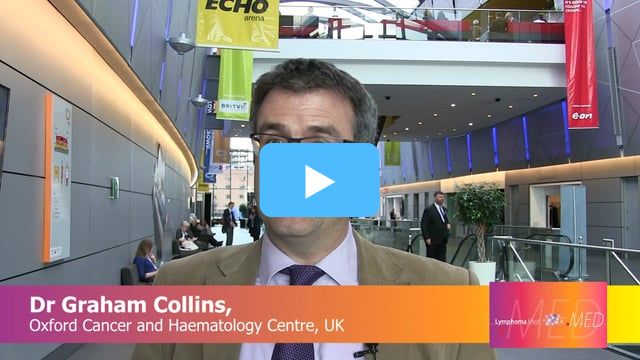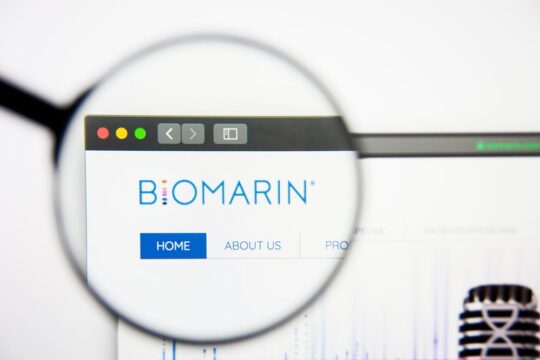BSH 2018: Access to new agents

Cancer drugs receive special funding in the NHS but it is not automatic and input from expert clinicians is essential to ensure that effective treatments are funded appropriately. The recent example of brentuximab vedotin in transplant-naïve patients illustrates the process and underlines the importance of clinician input…
Article by Christine Clark. Interviews by Alex Burton.
Dr Graham Collins (Oxford), one of the co-chairs of the Lymphoma SIG, gives an overview of the key areas covered in the session.
Expenditure on cancer drugs is rising faster than any other area and represents a major cost pressure in Specialised Commissioning and in the NHS as a whole, according to Professor Peter Clark, who chairs the NHS England Chemotherapy Clinical Reference Group (CRG). The task of the CRG is to ensure that the £2.3bn allocated for cancer drugs in the current year goes as far as possible.
A NICE technology appraisal (TA) determines whether a drug is cost-effective for the NHS. The standard threshold for cost-effectiveness for a drug in the UK is £20-30 thousand per quality-adjusted life year (QALY), a value that is lower than in many other countries. For cancer drugs, the threshold is £50 thousand per QALY for drugs that are likely to prolong life for more than three months in people who would otherwise have a life-expectancy of less than two years.
The real bonus of NICE technology appraisal is that if a drug receives a positive recommendation then the NHS is obliged to fund it. The role of the clinical expert here is to tell the committee whether the assumptions in the economic model are clinically sensible. Professor Clark urged experts to pay careful attention to this aspect of a NICE appraisal because it is often the economic modelling that is the key to a successful outcome.
Cancer drugs fund
NICE now appraises every new cancer indication and the appraisal process precedes formal licensing with a view to issuing NICE guidance at the time of licensing. In the past (until July 2016) appraisals had either ‘yes’ or ‘no’ outcomes but now the Cancer Drugs Fund (CDF) offers a third option for new drugs of uncertain clinical effectiveness. NICE can recommend funding through the CDF while clinical trial data mature or additional evidence is gathered.
A further benefit of the CDF is that funding is available as soon as NICE makes a positive recommendation. In effect, cancer drugs get funding six months sooner than non-cancer drugs because of the special status of cancer and cancer drugs.
In order to safeguard public funding the whole process is managed through agreements to collect evidence or to wait for clinical trial data to mature. In addition there are commercial agreements – the NHS will not pay the full price for a drug while its cost-effectiveness is uncertain – so all drugs listed in CDF come at advantageous prices.
Brentuximab vedotin– a success story
One instructive example of the NICE appraisal process was the use of brentuximab vedotin in stem-cell transplant (SCT) naïve HL patients who had relapsed or were refractory to two lines of combination chemotherapy.
The key to the decision-making process was rate of stem cell transplant (SCT) in this group of patients. The clinical expert advised that the rate was 28% but NICE was uncertain and chose a figure of 14% – a decision that could have led to negative recommendation. In fact, brentuximab vedotin (BV) had been in the CDF list since 2013 and so it was possible to identify all the patients who had received the drug. A cohort of 496 patients treated between April 2013 – April 2016 was identified and audit forms were sent to 223 consultants in 106 Trusts. There was an 88% response rate with 60 ‘missing’ cases from low-volume Trusts. Some 124 cases were excluded because BV was given after SCT. Of the 219 intended for SCT, 36% received BV alone and a further 22% needed BV and additional chemotherapy, making a total of 58%. In addition, 41% of patients who were not originally scheduled for SCT received transplants (25% after BV alone and 16% after BV and additional chemotherapy). If it is assumed that the 60 missing cases did not receive SCTs, then the figures become 34% receiving transplants (21% after BV alone and 13% after BV + chemo). This example underlines the importance of input from expert clinicians and the value of careful analysis of the available evidence. In this case, the economic model, revised on the basis of real-world evidence, supported a positive decision.
Working in this way, the CDF can help to resolve uncertainty about the effectiveness of cancer drugs and it has resulted in a steady increase in the number of positive appraisals since 2017. “Access to drugs for patients has improved a lot and access close to the time of licensing has improved”, said Professor Clark. However, funding is still limited and completion of the Blueteq (CDF request) forms is “incredibly important” because it allows tracking of outcomes, payment and accurate numbers of patients in different parts of the patient pathway. All of this information is needed for budget impact assessments that have to be carried out for new drugs with a predicted annual cost of more than £20million. Furthermore, showing that money is going to the right population at the right point in the treatment pathway, enables the CRG to defend its privileged funding within the Special Commissioning scheme.
In conclusion, Professor Clark said that the CDF gives drugs a “second chance” but there remains a collective responsibility to seek the best value for treatments by directing them to the patients on which their effectiveness has been based. Cancer drugs have special privileges and these must be protected through rigorous appraisal, commissioning and prescribing.
Based on a presentation given at the British Society of Haematology 58th Annual Scientific Meeting, Liverpool, UK.





